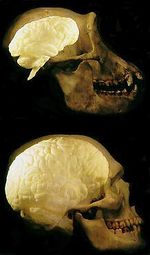Human personality syndrome
Human personality syndrome, also known as HPS, is a disorder affecting a significant but fortunately rapidly decreasing proportion of humankind, as well as certain non-humans. It is defined by the APA as "the ability to be sensitive, compassionate, sarcastic, cynical, etc. or otherwise demonstrate any individuality whatsoever", and is known to be a serious mental condition. Doctors, government and the media are working around the clock to inform people about and eventually eradicate this disorder.
Diagnosis[edit | edit source]
Three diagnosis criteria must be met for a person to be diagnosed with HPS. These are the following:
- Characteristic symptoms. Four or more of the following, each present for much of the time in a 1-minute period:
- Lack of hallucinations. Example: not seeing any pink elephants.
- Visible emotions about one's surroundings. Example: appreciating any form of art.
- Attentiveness. Examples include: understanding Shakespeare.
- Critical thinking. Examples include: not reading this article.
- Coherent language skills. Examples include: knowing the meaning of the word "candour" as well as the side of the Atlantic on which this spelling is used. Extant speaking, listening, writing and/or reading skills may result from an extant train of thought and strong connections between ideas expressed.
- Social/occupational success. Interpersonal relations, work, and self-care are extant.
- Duration. The current consensus holds that the above criteria should have been present for 5 minutes or more for the diagnosis to be valid.
As can be seen, diagnosis of HPS can be done very quickly. However, a psychologist must be careful not to misdiagnose the condition as "intelligence" or "life", which have both been accepted as no longer extant in humans.
Causes[edit | edit source]
Evidence suggests that genetic and environmental factors may act in combination to result in HPS.
Genetic[edit | edit source]
A major factor appears to be the structure of the brain, as determined by a person's genes. Typical brains have only 6.2 billion neurons, which would appear to be enough neurons for any human. However, the brains of those later diagnosed with human personality syndrome have 15-33 billion neurons in the cerebral cortex alone. This is the core genetic cause of HPS: sufferers have an abnormal gene that causes them to grossly overdevelop their brains.
Environmental[edit | edit source]
Living in a so-called "academic" environment is a consistent risk factor for HPS. A clear casual connection between overexposure to "literature" and HPS exists, and appears to be the reason that an academic setting is a serious risk factor for HPS.
HPS as social construct[edit | edit source]
The anti-psychiatry movement opposes the modern view of HPS as an actual mental disorder. Rather, these so-called "intellectuals" maintain that HPS is the media's explanation for individuals who are capable of innovation and constructive criticism of society. The movement argues that HPS is yet another form of social construction, yet another concept of normality and abnormality that fails to be objective. Naturally, this movement is utter balderdash.
Treatment[edit | edit source]
There are various ways of treating HPS, although some are more controversial than others.
Media[edit | edit source]
Television is generally accepted as the best way to cure a brain of human personality disorder. Psychiatrists will typically prescribe at least four hours of entertainment gossip and/or reality television per day. No BBC or PBS viewing is allowed, as this may worsen signs of HPS.
However, alternative treatments under the media category are undergoing tests. For example, the Internet is seen as a promising source of medication, as anti-HPS medication is available on a 24-hours-a-day, 7-days-a-week basis on such websites as YouTube, YTMND, and Uncyclopedia. Some psychiatrists may therefore prescribe a 36-hour session every week. However, whether the medication may end up being excessively concentrated is a controversy that has yet to be resolved.

Alternatives[edit | edit source]
Joining a cult is often prescribed in place of the above methods. While this is often criticised for being an over-reaction, psychiatrists claim that the patients that have undergone cult brainwashing have afterwards claimed to have "attained nirvana" and "been enlightened." Unfortunately, these results have often depressed psychiatrists themselves enough to join cults themselves, watering flowers side by side with their patients.
A group of psychiatrists have recently stood up to the consensus that HPS is a real mental disorder, and prescribed no treatment at all. In fact, they claim that "'HPS'" is the result of a mass brainwashing of psychiatrists, and that "'HPS sufferers'" should be models for all humans. Later, however, this group retracted their statements, while noting that "they were in no way being forced or coerced at gunpoint to retract our absolutely misguided claims."


